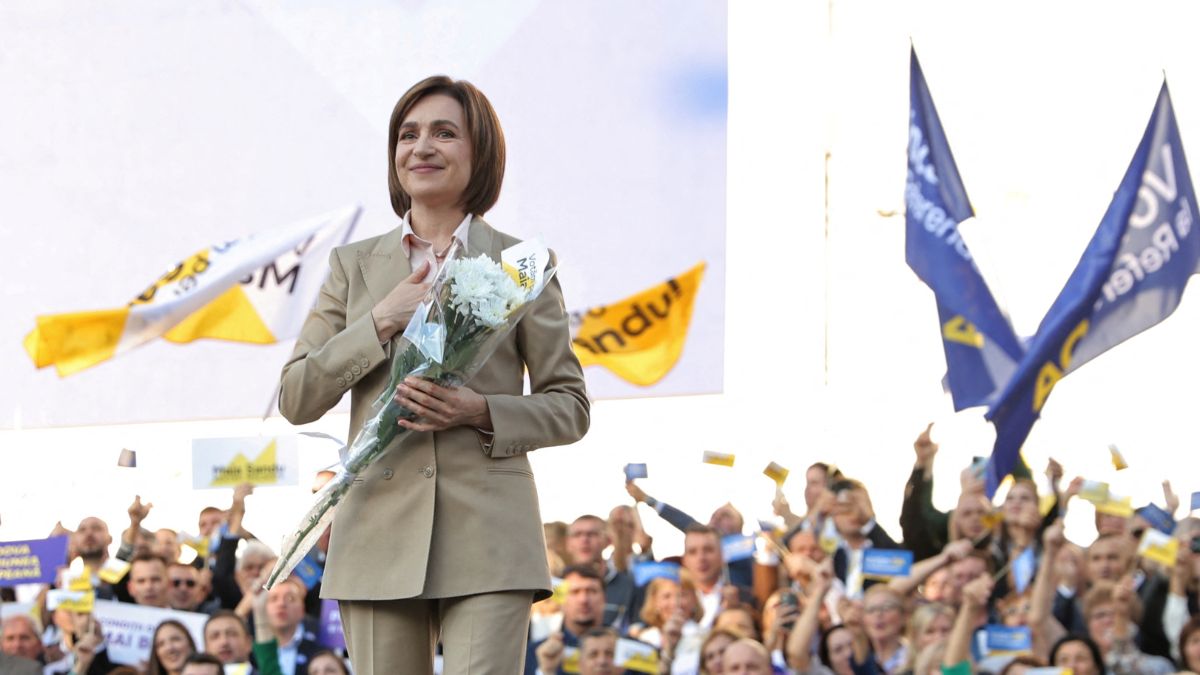Moldova on Monday (October 21) voted narrowly to join the European Union (EU) in a referendum.
As per the latest information, more than 99 per cent of the ballots have been counted and 50.28 per cent voters have voted to join the EU.
The referendum in Moldova, a country sandwiched between Ukraine and EU, faces threats from Russia. Following the Russian invasion of Ukraine in 2022, the sense of urgency in the nation had increased regarding the Russian threat. President Maia Sandu, a pro-West and pro-EU politician, had made joining the EU central to her agenda. She had beaten a Russia-backed candidate to become the president.
Even though Moldova has voted to join the EU, the narrow vote means that the road ahead is bumpy, particularly as Sandu has to win the people’s mandate.
The Moldovan referendum was held along with the presidential election in which no clear winner emerged. Sandu, who won 42 per cent of the vote, will have a run-off election with rival Alexandr Stoianoglo, won 26 per cent votes in a better-than-expected performances.
The narrow EU vote and the unclear mandate have dented Sandu’s agenda — at least for now. Stoianoglo is backed by Russia and is bound to kill any attempts to join the EU if he wins the presidency.
‘Unprecedented assault on freedom & democracy’
As the vote in favour of joining EU was worse-than-expected, Sandu said that
Moldova had witnessed “an unprecedented assault on our country’s freedom and democracy”, according to AFP.
Impact Shorts
More ShortsFollowing the vote, Sandu said that she “won justly in an unjust struggle”.
“We have won the first battle in a difficult fight that will determine the future of our country. We fought fairly and won justly in an unjust struggle,” said Sandu.
In a reference to elements in Moldova collaborating with Russia, Sandu blamed “criminal groups working together with foreign forces hostile to our national interests”.
In the run-up to the vote, there were widespread concerns regarding Russian interference and vote-buying schemes.
EU & Russia spar over Moldova’s referendum
Following Moldova’s referendum, the EU and Russia traded allegations. While the EU hailed the vote and accused Russia of interference, Russia accused Sandu of suppressing dissent and questioned the legitimacy of the vote.
Russia said that Moldova’s vote was not free and the results showed a “hard-to-explain” increase of votes in favour of Sandu and the EU, as per Reuters.
“What we see is a mechanically hard-to-explain rate of increase in votes in favour of Sandu and in favour of those referendum participants who favoured an EU orientation,” said Kremlin Spokesperson Dmitry Peskov said.
Rejecting Sandu’s allegations of interference, Peskov painted those opposed to her and joining the EU as legitimate critics.
Referring to the crackdown on pro-Russia groups suspected of interfering in the vote and buying votes in the referendum, in which hundreds were arrested, Peskov said that “they were persecuted, they were thrown into prisons, they were interrogated, they were not allowed into the country, the media were closed, Internet resources were blocked and so on”.
Peskov further said, “If she is saying that she did not receive votes because of certain criminal groups, she must present evidence. And it would be nice for Mrs Sandu to explain such a large number of voices which dissent from her line. Are these also criminal gangs? Or does she mean that Moldovan citizens who do not support her are associated with criminal gangs? There are a lot of nuances here.”
On his part, European Parliament President Roberta Metsola congratulated Moldova after the vote.
“Well done Republic of Moldova! Thank you for your bravery. Our future will be written together,” said Metsola in a post on X.


)

)
)
)
)
)
)
)
)



